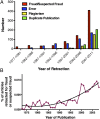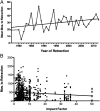Misconduct accounts for the majority of retracted scientific publications
- PMID: 23027971
- PMCID: PMC3479492
- DOI: 10.1073/pnas.1212247109
Misconduct accounts for the majority of retracted scientific publications
Erratum in
- Proc Natl Acad Sci U S A. 2013 Jan 15;110(3):1137
Abstract
A detailed review of all 2,047 biomedical and life-science research articles indexed by PubMed as retracted on May 3, 2012 revealed that only 21.3% of retractions were attributable to error. In contrast, 67.4% of retractions were attributable to misconduct, including fraud or suspected fraud (43.4%), duplicate publication (14.2%), and plagiarism (9.8%). Incomplete, uninformative or misleading retraction announcements have led to a previous underestimation of the role of fraud in the ongoing retraction epidemic. The percentage of scientific articles retracted because of fraud has increased ∼10-fold since 1975. Retractions exhibit distinctive temporal and geographic patterns that may reveal underlying causes.
Conflict of interest statement
The authors declare no conflict of interest.
Figures




Comment in
-
Predatory Publishing: An Emerging Threat to the Medical Literature.Acad Med. 2017 Feb;92(2):150-151. doi: 10.1097/ACM.0000000000001521. Acad Med. 2017. PMID: 28121685
References
-
- Van Noorden R. Science publishing: The trouble with retractions. Nature. 2011;478:26–28. - PubMed
-
- Steen RG. Retractions in the scientific literature: Is the incidence of research fraud increasing? J Med Ethics. 2011;37:249–253. - PubMed
-
- Nath SB, Marcus SC, Druss BG. Retractions in the research literature: Misconduct or mistakes? Med J Aust. 2006;185:152–154. - PubMed
-
- Steen RG. Retractions in the scientific literature: Do authors deliberately commit research fraud? J Med Ethics. 2011;37:113–117. - PubMed
-
- Wager E, Williams P. Why and how do journals retract articles? An analysis of Medline retractions 1988–2008. J Med Ethics. 2011;37:567–570. - PubMed
MeSH terms
LinkOut - more resources
Full Text Sources
Other Literature Sources

